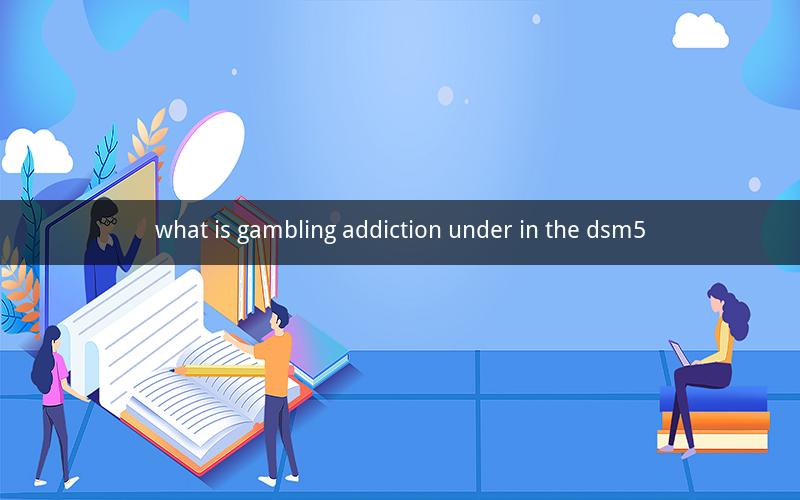
Table of Contents
1. Introduction to DSM-5
2. Understanding Gambling Addiction
3. Criteria for Gambling Addiction in DSM-5
4. Prevalence of Gambling Addiction
5. Risk Factors for Gambling Addiction
6. Symptoms of Gambling Addiction
7. Treatment Options for Gambling Addiction
8. The Impact of Gambling Addiction on the Individual
9. The Impact of Gambling Addiction on Families
10. Conclusion
1. Introduction to DSM-5
The Diagnostic and Statistical Manual of Mental Disorders, Fifth Edition (DSM-5) is the latest version of the manual used by mental health professionals to diagnose mental disorders. It provides a comprehensive framework for understanding and categorizing various mental health conditions.
2. Understanding Gambling Addiction
Gambling addiction, also known as problem gambling or compulsive gambling, is a disorder characterized by an inability to control or stop gambling despite negative consequences. Individuals with gambling addiction may experience a strong urge to gamble, spend excessive amounts of time and money on gambling activities, and feel a sense of loss when they are unable to gamble.
3. Criteria for Gambling Addiction in DSM-5
DSM-5 includes specific criteria for diagnosing gambling addiction. These criteria include:
- Repeated gambling despite harmful consequences.
- Needing to gamble with increasing amounts of money to achieve the desired excitement.
- Experiencing withdrawal symptoms such as irritability, anxiety, or depression when not gambling.
- Making unsuccessful attempts to stop or reduce gambling.
- Risking or losing significant relationships, work, or other responsibilities due to gambling.
- Continuing to gamble despite knowing the consequences.
4. Prevalence of Gambling Addiction
Gambling addiction is a common problem, with estimates indicating that between 2% and 3% of the population may have a gambling addiction. However, these numbers may be underestimates due to the stigma associated with the disorder.
5. Risk Factors for Gambling Addiction
Several risk factors have been identified for gambling addiction, including:
- Family history of gambling addiction.
- Mental health disorders, such as depression or anxiety.
- Exposure to gambling through family, friends, or media.
- Impulse control disorders.
- Personality traits, such as sensation-seeking or thrill-seeking.
6. Symptoms of Gambling Addiction
Symptoms of gambling addiction can vary from person to person, but common symptoms include:
- Preoccupation with gambling thoughts.
- Inability to control gambling behavior.
- Increasing time spent on gambling activities.
- Experiencing mood swings or irritability when not gambling.
- Using gambling as a means to cope with stress or negative emotions.
7. Treatment Options for Gambling Addiction
Treatment for gambling addiction can include various approaches, such as:
- Cognitive-behavioral therapy (CBT) to help individuals identify and change harmful thoughts and behaviors related to gambling.
- Support groups, such as Gamblers Anonymous, to provide peer support and encouragement.
- Medication, such as antidepressants or mood stabilizers, to help manage underlying mental health disorders.
- Financial counseling to help individuals manage their finances and reduce the risk of financial harm.
8. The Impact of Gambling Addiction on the Individual
Gambling addiction can have a significant impact on the individual, including:
- Financial problems, such as debt or bankruptcy.
- Relationship problems, such as marriage or family issues.
- Legal problems, such as fraud or theft.
- Mental health issues, such as depression or anxiety.
9. The Impact of Gambling Addiction on Families
Gambling addiction can also have a profound impact on families, including:
- Financial strain, such as supporting an addicted family member.
- Emotional stress, such as dealing with a family member's gambling problems.
- Relationship problems, such as marriage or family issues.
10. Conclusion
Gambling addiction is a serious disorder that can have significant consequences for both the individual and their family. Understanding the criteria for gambling addiction in DSM-5 and the various treatment options available can help individuals seek the support and resources they need to overcome their addiction.
Questions and Answers
1. What is the difference between problem gambling and gambling addiction?
- Problem gambling is characterized by harmful gambling behavior, while gambling addiction is a more severe form of problem gambling that meets specific criteria for diagnosis.
2. Can gambling addiction be treated?
- Yes, gambling addiction can be treated through various approaches, such as cognitive-behavioral therapy, support groups, and medication.
3. Are there any genetic factors that contribute to gambling addiction?
- Yes, research suggests that genetic factors may play a role in the development of gambling addiction.
4. Can individuals with gambling addiction recover?
- Yes, many individuals with gambling addiction can recover with the right support and treatment.
5. How can I recognize the signs of gambling addiction in someone I know?
- Signs of gambling addiction may include preoccupation with gambling, increased time spent on gambling activities, and negative consequences as a result of gambling.
6. Are there any support groups available for individuals with gambling addiction?
- Yes, there are many support groups available, such as Gamblers Anonymous, that provide peer support and encouragement.
7. Can medication help treat gambling addiction?
- Yes, medication can help manage underlying mental health disorders that may contribute to gambling addiction.
8. How can I help a loved one who has a gambling addiction?
- Encouraging them to seek professional help, providing support, and being patient are ways to help a loved one with a gambling addiction.
9. Can gambling addiction lead to legal problems?
- Yes, gambling addiction can lead to legal problems, such as fraud or theft, as individuals may turn to illegal means to support their gambling habits.
10. How can I prevent gambling addiction in myself?
- Setting limits on gambling, being aware of the signs of problem gambling, and seeking help if you feel you are developing a gambling problem are ways to prevent gambling addiction.